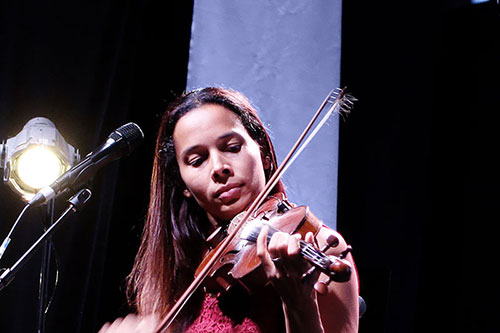What did the Blackbird say to the Crow

I’ve been listening to a new record this past weekend, What Did the Blackbird Say to the Crow, by Rhiannon Giddens and Justin Robinson. It’s an album of old-time music, with Robinson fiddling and Giddens playing banjo. She uses both a regular banjo – well, regular for old-time, meaning it doesn’t have the resonator used by bluegrass players – and a lower-strung, fretless variation called a minstrel banjo.
What jumped out at me about this record was how Appalachian it sounds to me. Listening to it made me suddenly aware of how much time I’ve spent with the Illinois-Missouri style of late. Robinson plays tunes with shorter, simpler phrases than what I’ve been playing the last six months – which is not to say that anything they’re doing is simple. They have the sound of someone dancing on their porch on a summer afternoon, all casual grace and the supreme subtlety of having feet that know every contour of every floorboard.
I don’t think I’d appreciated until now just how funky Appalachian old-time is. The word “funk” comes from the German, meaning “spark.” It was shorthand for “blacksmith” in days gone by (because blacksmithing makes sparks), but nowadays is associated with a popular form of dance music from the 1970’s. I’ve been working on a longer piece about rhythm more generally, that may or may not include a tangent about James Brown, Bootsy Collins, and the concept of “the one,” so I don’t want to get too much into it here. But I think there’s something to the likeness. The tunes all have a kind of groove to them, and the music just kind of vibes on it.
Giddens and Robinson were both founding members of the Carolina Chocolate Drops, a project that emerged out of a convention of Black banjo players and went on to garner critical acclaim (and the last Grammy for “Best Traditional Folk” album, before the category was retired in 2012). The Chocolate Drops performed old-timey music, from Appalachian dance tunes to early jazz songs and reinterpreted contemporary pop. I was lucky enough to see them once – the group at the time included Giddens, Don Flemons, and Hubby Jenkins – at the Pritzker bandshell in Chicago back in 2013. They did one of the things I really love about old-time music: they played it, but they also told stories about it in between numbers. And because, in addition to being great performers, they’re all scholars of the music, I came away deeply impressed.
Sadly, the Chocolate Drops broke up sometime later. Since then, Giddens has positively flourished, winning a MacArthur Genius award and the Pulitzer Prize, taking over the directorship of the Silk Road Ensemble from Yo-Yo Ma, and producing “Aria Code,” a podcast about opera (she majored in opera singing at Oberlin College). And, of course, she played banjo on Beyoncé’s 2024 hit “Texas Hold ‘Em.” She’s about as close to an old-time superstar as you can get. When I was looking up the Grammy awards she’s won, I ended up looking through who had won the “Best Traditional Folk” award. Doc Watson and Norman Blake, also old-time superstars, I’d argue, both won more than once (along with the Bulgarian State Television Choir, which I listened to obsessively one summer years ago). Watson and Blake are both revered figures in traditional music (for good reason, too) and I think what Giddens and Robinson are doing is on the same level. Its still folk music, deeply rooted in tradition and community, but the musicianship is of the highest level.
While I love what they’re doing, and that they’re reclaiming the role of Black people in Appalachian folkways, Giddens and Robinson still sound like mountain music to me. What I’ve been focused on is prairie music: long, notey melodic lines played over simple, sturdy rhythms. The contrast between the two styles is fascinating to me because I don't think I would have heard all that much difference a year ago, but now it feels obvious. Especially because, much as I enjoy Robinson's fiddling - "Fly all around my Pretty Little Miss," in particular, since that one's in my repertoire - I don't really want to emulate it. No, I'm still stuck on that bouncy, hornpipey midwestern sound.
Add a comment: